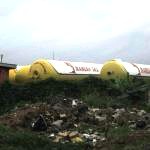Thousands of lives and properties in residential areas of the country are under threat and likely to suffer from severe burns and possible deaths in the case of humans, if measures are not taken to halt the wanton abuse of laid down rules and regulations in the construction of gas and fuel stations in residential areas of Ghana.
National Petroleum Authority (NPA) rules and regulation stipulate that gas and fuel stations should be situated at a minimum of 30.8 meters (100ft) from residential areas.
This situation has arisen as a result of the constant neglect of city authorities are persistently turning a deaf ear to is posing danger to lives and properties in residential areas.
In Ghana over the years, gas and fuel explosion have been the cause of destruction of precious lives and properties, citing the recent gas explosion incidence at Axim, a farming community in the Western Region.
In the Greater Accra region for instance checks by Today reveal that some of the gas and fuel stations which are owned by the central government and individuals are sited as close as five meters to homes and businesses whilst the National Petroleum Authority (NPA) rules and regulation stipulates that gas and fuel stations should be situated at a minimum of 30.8 meters (100ft) from residential areas.
Today further observed that some of the fuel and gas stations were situated on plots earmarked for residential purposes.
At Abeka-Lapaz for instance, Today investigation team spotted eight fuel and nine gas stations situated close to residences, restaurants, super markets, schools and churches.
The situation is much dangerous at Santa-Maria Last Stop, where a gas station is situated close to a refuse dump which is continuously blazing dangerously.
Fuel and gas stations also situated at the Osu Police Station, Osu-Kajaano and Addy junction between Odorkor to Kwashieman, stretch right in front of houses, businesses and churches. In addition, a fuel station situated opposite the Odorkor Lorry station on the Kaneshie-Mallam road is very close to houses and shopping centers with another fuel and gas station at Jar Love Hotel near Kwashieman situated close to a drinking spot.
The Greater Accra was not the only region fallen foul of the law-at Kumasi specifically the KNUST junction and Asafo are eight fuel stations which are all located close to houses and business.
In contrast to our findings, the NPA documents states that: ‘stations will not be allowed in any area where the traffic situation is such that it will cause obstruction when entering or leaving a station.
Another guideline in the document is that petrol pumps shall be located at a minimum of 30.8 meters/100ft from any residential building; Where the site adjoins the side or rear boundary of a residential lot, a solid wall of 10ft in height should be constructed and maintained along lot boundary,’ the document stated.
An official of the Environmental Protection Agency (EPA) who spoke to Today on condition of anonymity stated that EPA gives permit for the construction of filling stations after it has conducted an environmental analysis of the area.
He said the analysis is to ascertain if the soil and environment for the construction is suitable to have a fuel tank underneath and whether it would not pose any danger to inhabitants around the area.
A top official of the Accra Regional Directorate of the Town and Country Planning (TCP), told Today that the TCP serves as physical planning department, process the applications by various oil marketing companies adding that this is done, before a technical sub-committee meets to evaluate the application, visits the site and makes recommendations to the Statutory Planning Committee (SPC) which are the Metropolitan, Municipal District Assemblies MMDAs which includes the Mayor of Accra, EPA, Ghana National Fire Service (GNFS), engineers and other agencies.
Officials of the Accra Metropolitan Assembly (AMA) told Today that permits are not given to build fuel or gas stations in areas that could affect people.
They said it is illegal for anybody to construct a fuel station without a permit, adding that the AMA in some instances had stopped people from building fuel stations in residential areas.
An official of the Ghana National Fire Service also said according to the LI1724 Fire precaution Premises Regulation of 2003, the fire services is legally mandated to check the location of such business before its construction. The official said the owners need to bring drawing of the fuel station for determination and checks whether it would not be a bother to the people in terms of safety.
“The GNFS will not give permit to anyone who decides to construct an LPG filling station in a residential area,” the official stressed.
General News of Thursday, 30 August 2012
Source: todaygh.com
DANGER! Fuel and Gas stations threaten lives













